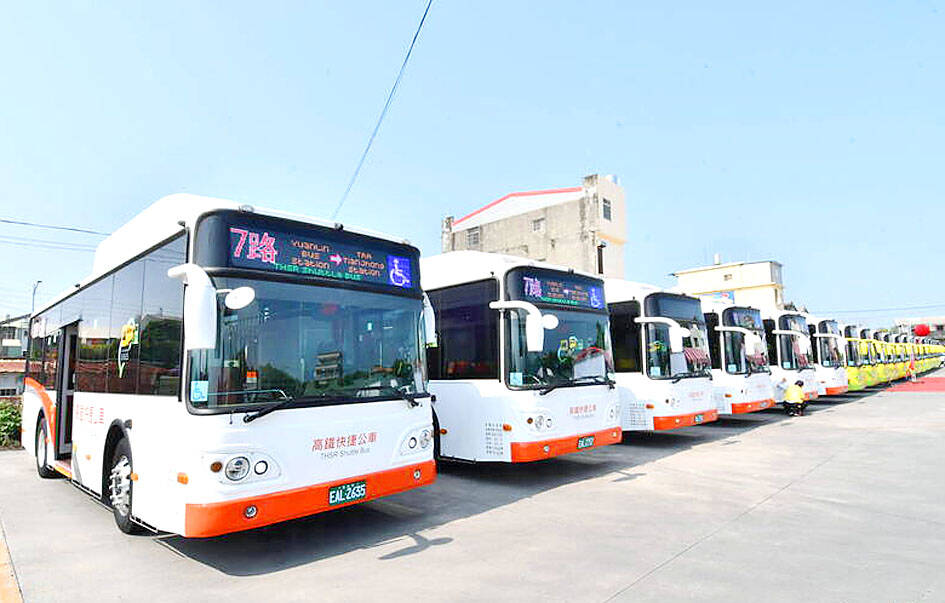The Executive Yuan yesterday approved a proposal to have 9,400 diesel-powered city buses across the nation replaced by electric buses by 2030 at a cost of NT$64.3 billion (US$2.09 billion).
The plan proposed by the Ministry of Transportation and Communications is part of the government’s efforts to reach its goal of net zero emissions by 2050.
City bus operators have been reluctant to procure electric buses because of their relatively poor performance, high price, scarcity of charging facilities, lack of logistics and maintenance services, and failure to implement localization of key technologies and components, the ministry said in a statement following yesterday’s Cabinet meeting.

Photo: Chung Li-hua, Taipei Times
After formulating new strategies and timelines to achieve the net zero goal, a three-year pilot project of electric buses was launched in 2020 through the efforts of the ministry, the Environmental Protection Administration and the Ministry of Economic Affairs, it said.
From 2020 to last year, 500 electric vehicles were designed, developed and produced by Taiwanese manufacturers for use by domestic operators, the transportation ministry said.
Taiwan has two electric bus manufacturers — RAC Electric Vehicle and Master Transportation Electric Bus — that have met localization requirements and begun mass production, it said.
Four other manufacturers are trying to meet localization requirements for electric buses, it said.
In the next seven years, the government would begin promoting the use of electric buses, the transportation ministry said.
“The nation still has about 9,400 diesel-powered buses to be replaced by electric buses by 2030,” it said. “To ensure sufficient funding for the project, we worked with the Environmental Protection Administration to jointly submit a plan to promote the use of electric buses from next year to 2030.”
Apart from vehicle purchase subsidies for bus operators, the plan also includes funds to establish maintenance systems, passenger transport operation subsidies and road network optimization, it said.
In the “Taiwan’s Net Zero Emissions Path and Strategy by 2050,” which was announced in March, 12 key strategies were proposed, one of which is electrification and decarbonization of public transportation and giving priority to passenger vehicles with mature technologies, it said.
“With the development of technology, other vehicles would be electrified or carbon-free, so the full electrification of city buses by 2030 would be significant,” it said. “It is also an important step for net zero emissions in 2050.”
The development of electric buses would also create manufacturing jobs and make Taiwan part of the international electric vehicle supply chain, it added.
To meet the goal of electrifying the entire nation’s fleet of city buses within seven years, about 1,300 buses would need to be replaced annually, Premier Chen Chien-jen (陳建仁) said.
“It is a government-wide effort to reach emissions goals. We are subsidizing the industry, and we are also asking local governments to assist bus operators and promote the electrification of their local fleets,” Chen said.

Alain Robert, known as the "French Spider-Man," praised Alex Honnold as exceptionally well-prepared after the US climber completed a free solo ascent of Taipei 101 yesterday. Robert said Honnold's ascent of the 508m-tall skyscraper in just more than one-and-a-half hours without using safety ropes or equipment was a remarkable achievement. "This is my life," he said in an interview conducted in French, adding that he liked the feeling of being "on the edge of danger." The 63-year-old Frenchman climbed Taipei 101 using ropes in December 2004, taking about four hours to reach the top. On a one-to-10 scale of difficulty, Robert said Taipei 101

Nipah virus infection is to be officially listed as a category 5 notifiable infectious disease in Taiwan in March, while clinical treatment guidelines are being formulated, the Centers for Disease Control (CDC) said yesterday. With Nipah infections being reported in other countries and considering its relatively high fatality rate, the centers on Jan. 16 announced that it would be listed as a notifiable infectious disease to bolster the nation’s systematic early warning system and increase public awareness, the CDC said. Bangladesh reported four fatal cases last year in separate districts, with three linked to raw date palm sap consumption, CDC Epidemic Intelligence

Taiwanese and US defense groups are collaborating to introduce deployable, semi-autonomous manufacturing systems for drones and components in a boost to the nation’s supply chain resilience. Taiwan’s G-Tech Optroelectronics Corp subsidiary GTOC and the US’ Aerkomm Inc on Friday announced an agreement with fellow US-based Firestorm Lab to adopt the latter’s xCell, a technology featuring 3D printers fitted in 6.1m container units. The systems enable aerial platforms and parts to be produced in high volumes from dispersed nodes capable of rapid redeployment, to minimize the risk of enemy strikes and to meet field requirements, they said. Firestorm chief technology officer Ian Muceus said

MORE FALL: An investigation into one of Xi’s key cronies, part of a broader ‘anti-corruption’ drive, indicates that he might have a deep distrust in the military, an expert said China’s latest military purge underscores systemic risks in its shift from collective leadership to sole rule under Chinese President Xi Jinping (習近平), and could disrupt its chain of command and military capabilities, a national security official said yesterday. If decisionmaking within the Chinese Communist Party has become “irrational” under one-man rule, the Taiwan Strait and the regional situation must be approached with extreme caution, given unforeseen risks, they added. The anonymous official made the remarks as China’s Central Military Commission Vice Chairman Zhang Youxia (張又俠) and Joint Staff Department Chief of Staff Liu Zhenli (劉振立) were reportedly being investigated for suspected “serious